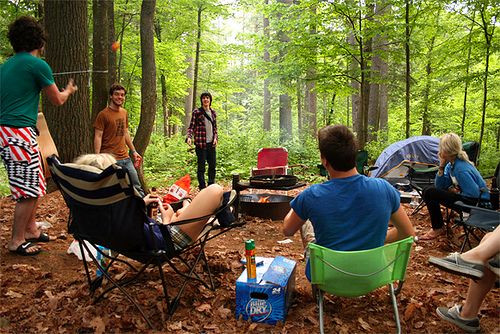Survival Tips to Avoid Getting Eaten by a Bear and Other Safety Tips for Outdoor Activities

While the last thing on your mind is getting eaten by a bear, recreation and tourism management stresses the importance of outdoor safety tips.
Dr. Aram Attarian, an expert on camping and outdoor adventure safety and a professor of parks, recreation and tourism management at North Carolina State University, has composed a book for use in outdoor leadership and adventure education classes.
Dr. Attarian has composed more than 50 scenarios involving lightning strikes, wildlife encounters and lost students in a book entitled Risk Management in Outdoor and Adventure Programs. His experience and expertise can help those of you who enjoy hiking, camping, climbing, rafting and other outdoor activities.
Dr. Attarian's first recommendation is prior to embarking on activities, do your research. Check the factors such as the weather forecast, as well as selecting the appropriate equipment for the trip.
Following your research, he recommends you become both mentally and physically prepared for the trip.
"If you're getting ready for a new outdoor activity or a destination trip, start a routine of walking or running a few months ahead. For two popular activities, backpacking and climbing, it's all legs and lungs. You need to have a good attitude as well," Dr. Attarian said.
Dr. Attarian suggests becoming familiar with park grounds.
Next, he recommends, "Leave your itinerary with someone, with a day-by-day plan, so that if you're late showing up, searchers will know where to start."
According to Dr. Attarian, weather, stream, river crossings and interactions with wildlife are a few of the environmental factors one may come across.
When a thunderstorm approaches, you should proceed from a high-risk to a low-risk environment. That includes seeking shelter in a building or metal vehicle. If by any chance you get caught in a thunderstorm assume a lightening stance. Put your pack on the ground and crouch on top. Wait half an hour after the storm passes to resume activity.
When it comes to relying on technology, Dr. Attarrian said, "We all have cell phones, but they don't work everywhere. For example if you're down in Linville Gorge, you may have to hike to the top to get reception."
In addition, remember to not only carry satellite phone, but also a map and a compass for navigation, in case a GOPS cannot come in handy.
Published by Medicaldaily.com



























